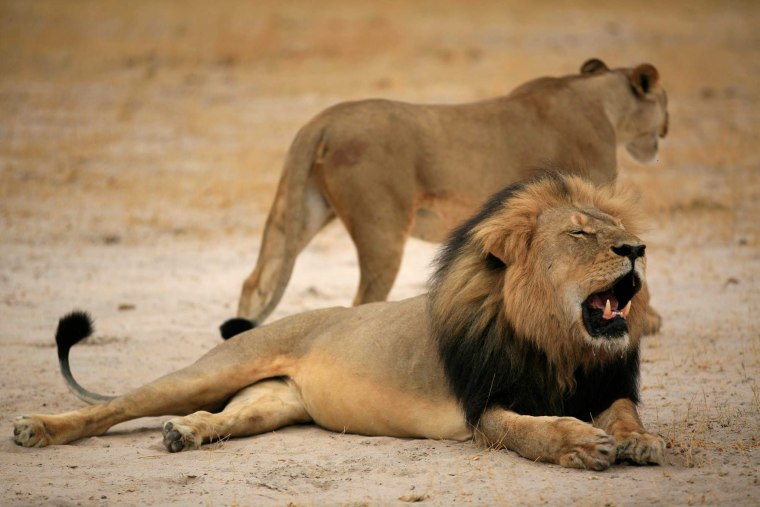In the midst of global outrage after the death of Cecil the lion in Zimbabwe, three prominent airlines announced Monday that they would be banning shipments of hunted animal "trophies" from their planes.
Just hours after Delta Airlines announced a ban, United and American Airlines also announced they will no longer allow "trophies" to be transported on their planes.
"I don't know why anybody wants those kinds of 'trophies,''' a passenger on a Delta flight told Gabe Gutierrez on TODAY Tuesday. "I mean, I just don't. If you're not gonna eat it why kill it?"
RELATED: Idaho huntress speaks out after her 'kill' photos spark outrage
In the wake of Cecil's death, hunters who have posted photos with their kills on social media have received an overwhelming backlash, including Idaho huntress Sabrina Corgatelli. Pictures she posted on Facebook of her posing with multiple animals she killed on a recent legal hunt in South Africa, including a giraffe, have received thousands of negative comments.
"Everybody just thinks we're cold-hearted killers, and it's not that,'' she told TODAY's Carson Daly Monday. "There is a connection with the animal, and just because we hunt them doesn't mean we don't have a respect for them."
Zimbabwe is seeking the extradition of Minnesota dentist Walter Palmer, who is accused of killing Cecil, one of the oldest and most famous lions in Zimbabwe, without a permit. Palmer has shuttered his practice and gone into hiding since it was revealed that he killed Cecil. Palmer told the Minneapolis Star on Monday that "everything is fine," but declined to comment further or reveal his location. He has maintained that everything about the trip was legal to his knowledge and that he deeply regrets killing Cecil.
Wildlife officials have also accused a second American, Pennsylvania doctor and bow hunter Jan Seski, of killing a lion in April without a quota and permit.
"This is not really a story about good guys and bad guys,'' David MacDonald of the Wildlife Conservation Research Unit at Oxford University told Gutierrez. "This is a story about how humanity wants to interact in the long run with nature and I think this is a historic moment."
A 2009 report by a conservation group estimated that the hunting business generates about $200 million a year in Africa and kills about 105,000 animals annually. In the wake of Cecil's death, officials in Zimbabwe have suspended big-game hunting in the park near where he was killed, but have not banned it outright. Hunting supporters say a ban on big-game hunting would be a mistake.

"The fastest way to threaten a species is to quit hunting it,'' U.S. Sportsmen's Alliance president and CEO Nick Pinizzotto told Gutierrez. "There's great value on those animals because people do want to pursue them as big game, and they're willing to pay a lot of money to do that. And that money then goes directly into conservation of that animal."